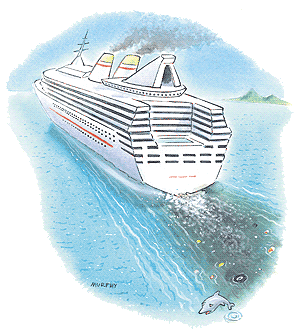Cleaner Cruises, Toxic Breast Milk and the Gift of a Tree
What is the environmental impact of cruise ships?
—David Haviland, Ann Arbor, MI

Chris Murphy Illustration
For several million passengers each year, an ocean cruise can be the ultimate vacation. But according to the activist group Bluewater Network, "from 1993 to 1998, cruise ships were involved in 104 detected and confirmed cases of illegal discharges of oil, garbage and hazardous wastes, and they paid more than $30 million in fines." Royal Caribbean Cruises alone pled guilty to 21 felony counts for illegal pollution, falsifying documents and lying to the U.S. Coast Guard. Vice President Michael Crye of the International Council of Cruise Lines claims that "the cruise industry is working to develop solutions to environmental challenges." But a March 2000 U.S. General Accounting Office report states that "important issues remain."
To make sure your travel dollars don’t support unsustainable activities, consult Bluewater Network and the Center for Marine Conservation for each company’s environmental record. When planning a trip, ask your travel agent about the company’s operating guidelines and environmental philosophy. For a lower-impact line, contact the International Ecotourism Society. Any suspicious dumping or pollution at sea should be reported to the U.S. Coast Guard National Response Center at (800) 424-8802.
CONTACTS
Bluewater Network
Tel: (415) 788-3666
Center for Marine Conservation
Tel: (202) 429-5609
International Ecotourism Society
Tel: (802) 651-9818
How can I have a tree planted in someone’s name as a gift?
—Tracie Adrian, Brattleboro, VT
Flowers may fade and store-bought presents may break, but the gift of a living tree will enrich the health and beauty of the planet for generations to come. According to the National Arbor Day Foundation, even a single tree, which may seem a humble combatant in the war against widespread deforestation, can produce $31,250 worth of oxygen, provide $62,000 worth of air pollution control, prevent $31,500 in soil erosion and protect $37,500 of water in 50 years of growth.
The National Arbor Day Foundation provides more than eight million trees for planting in America each year, and for each $10 donated to its Trees in Memory or Trees in Celebration programs, 10 Lodgepole pine or Douglas fir trees will be planted in damaged national forests. A certificate will be sent to the person or group being honored. If you would prefer to have a tree dedicated in the state of your choice, then consider TreeGivers, a New Hampshire-based organization that has established hundreds of thousands of gift trees on public parks and reclamation areas since 1981 ($29.50 minimum). Trees for the Future will plant 200 fast-growing trees in developing countries for a $50 donation.
CONTACTS
National Arbor Day Foundation
Tel: (402) 474-5655
TreeGivers
Tel: (800) 862-8733
Trees for the Future
Tel: (800) 643-0001
Should mothers get their breast milk tested for DDT, dioxins or PCBs?
—Aurora Grey, Philadelphia, PA
The American Academy of Pediatrics (AAP) does not recommend testing breast milk because of a lack of standard procedures and an absence of established "normal" and "abnormal" interpretive values. "Everybody has some of the contaminants present, but there are no quality control assurance programs that can tell you if the lab is doing the testing correctly," explains Dr. Walter Rogan of the National Institute of Environmental Health Sciences.
Scientists have discovered an alarming number of toxins in human breast milk, including pesticides such as DDT and highly toxic PCBs. The Environmental Protection Agency estimates that infants who are breast fed for more than a year receive four to 12 percent of their total lifetime exposure to dioxins. A report commissioned by the World Wide Fund for Nature identified more than 350 toxic substances in human breast milk.
Though these statistics are disturbing, the benefits of breastfeeding outweigh the concerns. Mothers" milk provides essential nutrients, hormones and antibodies to infants. The AAP says the decrease in infant mortality among breast-fed infants overwhelms the current estimate of the small risk to the child—even for women at the 95th percentile of PCB levels.
CONTACT
American Academy of Pediatrics
Tel: (847) 434-4000

